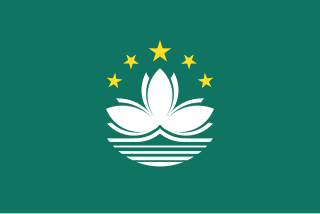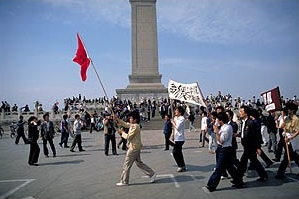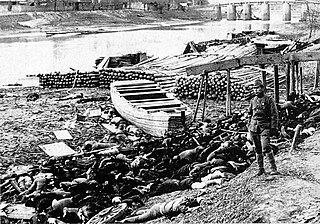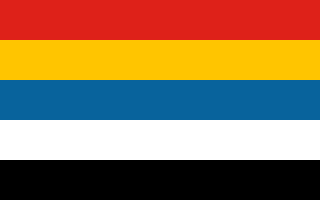
China, officially the People's Republic of China (PRC), is a country in East Asia. With a population exceeding 1.4 billion, it is the second-most populous country after India, representing 17.4% of the world population. China spans the equivalent of five time zones and borders fourteen countries by land. With an area of nearly 9.6 million square kilometers (3,700,000 sq mi), it is the third-largest country by total land area. The country is divided into 33 province-level divisions: 22 provinces, five autonomous regions, four municipalities, and two semi-autonomous special administrative regions. Beijing is the country's capital, while Shanghai is its most populous city by urban area and largest financial center.

Chinese is a group of languages spoken natively by the ethnic Han Chinese majority and many minority ethnic groups in China, as well as by various communities of the Chinese diaspora. Approximately 1.35 billion people, or 17% of the global population, speak a variety of Chinese as their first language.

The Chinese Communist Party (CCP), officially the Communist Party of China (CPC), is the founding and sole ruling party of the People's Republic of China (PRC). Under the leadership of Mao Zedong, the CCP emerged victorious in the Chinese Civil War against the Kuomintang. In 1949, Mao proclaimed the establishment of the People's Republic of China. Since then, the CCP has governed China and has had sole control over the People's Liberation Army (PLA). Successive leaders of the CCP have added their own theories to the party's constitution, which outlines the party's ideology, collectively referred to as socialism with Chinese characteristics. As of 2024, the CCP has more than 99 million members, making it the second largest political party by membership in the world after India's Bharatiya Janata Party.

Hong Kong is a special administrative region of China. With 7.4 million residents of various nationalities in a 1,104-square-kilometre (426 sq mi) territory, Hong Kong is the fourth most densely populated region in the world.

Macau or Macao is a special administrative region of the People's Republic of China. With a population of about 710,000 people and a land area of 32.9 km2 (12.7 sq mi), it is the most densely populated region in the world.

Mao Zedong, also known as Chairman Mao, was a Chinese politician, revolutionary, and political theorist who founded the People's Republic of China (PRC) and led the country from its establishment in 1949 until his death in 1976. Mao also served as the chairman of the Chinese Communist Party (CCP) from 1943 until his death, and as the party's de facto leader from 1935. His theories, which he advocated as a Chinese adaptation of Marxism–Leninism, are known as Maoism.

The Qing dynasty, officially the Great Qing, was a Manchu-led imperial dynasty of China and an early modern empire in East Asia. The last imperial dynasty in Chinese history, the Qing dynasty was preceded by the Ming dynasty and succeeded by the Republic of China. At its height of power, the empire stretched from the Sea of Japan in the east to the Pamir Mountains in the west, and from the Mongolian Plateau in the north to the South China Sea in the south. Originally emerging from the Later Jin dynasty founded in 1616 and proclaimed in Shenyang in 1636, the dynasty seized control of the Ming capital Beijing and North China in 1644, traditionally considered the start of the dynasty's rule. The dynasty lasted until the Xinhai Revolution of October 1911 led to the abdication of the last emperor in February 1912. The multi-ethnic Qing dynasty assembled the territorial base for modern China. The Qing controlled the most territory of any dynasty in Chinese history, and in 1790 represented the fourth-largest empire in world history to that point. With over 426 million citizens in 1907, it was the most populous country in the world at the time.

Taiwan, officially the Republic of China (ROC), is a country in East Asia. The main island of Taiwan, also known as Formosa, lies between the East and South China Seas in the northwestern Pacific Ocean, with the People's Republic of China (PRC) to the northwest, Japan to the northeast, and the Philippines to the south. It has an area of 35,808 square kilometres, with mountain ranges dominating the eastern two-thirds and plains in the western third, where its highly urbanized population is concentrated. The combined territories under ROC control consist of 168 islands in total covering 36,193 square kilometres. The largest metropolitan area is formed by Taipei, New Taipei City, and Keelung. With around 23.9 million inhabitants, Taiwan is among the most densely populated countries.

Shanghai is a direct-administered municipality and the most populous urban area in China. The city is located on the Chinese shoreline on the southern estuary of the Yangtze River, with the Huangpu River flowing through it. The population of the city proper is the third largest in the world, with around 24.87 million inhabitants in 2023, while the urban area is the most populous in China, with 29.87 million residents. As of 2022, the Greater Shanghai metropolitan area was estimated to produce a gross metropolitan product (nominal) of nearly 13 trillion RMB. Shanghai is one of the world's major centers for finance, business and economics, research, science and technology, manufacturing, transportation, tourism, and culture. The Port of Shanghai is the world's busiest container port.

The Tiananmen Square protests, known within China as the June Fourth Incident, were student-led demonstrations held in Tiananmen Square in Beijing, China, lasting from 15 April to 4 June 1989. After weeks of unsuccessful attempts between the demonstrators and the Chinese government to find a peaceful resolution, the Chinese government deployed troops to occupy the square on the night of 3 June in what is referred to as the Tiananmen Square massacre. The events are sometimes called the '89 Democracy Movement, the Tiananmen Square Incident, or the Tiananmen uprising.

The Nanjing Massacre or the Rape of Nanjing was the mass murder of Chinese civilians by the Imperial Japanese Army in Nanjing, the capital of the Republic of China, immediately after the Battle of Nanking and retreat of the National Revolutionary Army during the Second Sino-Japanese War. The massacre took place over a period of six weeks beginning on December 13, 1937. Estimates of the death toll vary from a low of 40,000 to a high of over 300,000, and estimates of rapes range from 20,000 to over 80,000. Most scholars support the validity of the International Military Tribunal for the Far East, which estimated that at least 200,000 were killed. Other crimes included torture, looting, and arson. The massacre is considered one of the worst wartime atrocities in history. In addition to civilians, numerous POWs and men who looked of military-age were indiscriminately slaughtered.

Laozi, also romanized as Lao Tzu and various other ways, is a semi-legendary ancient Chinese philosopher and author of the Tao Te Ching (Laozi), the foundational text of Taoism along with the Zhuangzi. A Chinese honorific typically translated as "the Old Master (zi)", the name and text were likely intended to portray an archaic anonymity that could converse with Confucianism. Modern scholarship generally regards his biographical details as later inventions, and his opus a collaboration. Traditional accounts addend him as Li Er, born in the 6th century BC state of Chu during China's Spring and Autumn period. Serving as the royal archivist for the Zhou court at Wangcheng, he met and impressed Confucius on one occasion, composing the Tao Te Ching in a single session before retiring into the western wilderness.

The Second Sino-Japanese War was fought between the Republic of China and the Empire of Japan between 1937 and 1945, following a period of war localized to Manchuria that started in 1931. It is considered part of World War II, and often regarded as the beginning of World War II in Asia. It was the largest Asian war in the 20th century and has been described as "the Asian Holocaust," in reference to the scale of Japanese war crimes against Chinese civilians. It is known in China as the War of Resistance against Japanese Aggression.

Chongqing is a direct-administered municipality in Southwestern China. Chongqing is one of the four direct-administered municipalities under the Central People's Government, along with Beijing, Shanghai, and Tianjin. It is the only directly administrated municipality located deep inland. The municipality covers a large geographical area roughly the size of Austria, which includes several disjunct urban areas in addition to Chongqing proper. Due to its classification, the municipality of Chongqing is the largest city proper in the world by population, though Chongqing is not the most populous urban area.

Xi Jinping is a Chinese politician who has been the general secretary of the Chinese Communist Party (CCP) and chairman of the Central Military Commission (CMC), and thus the paramount leader of China, since 2012. Xi has been serving as the seventh president of China since 2013. As a member of the fifth generation of Chinese leadership, Xi is the first CCP general secretary born after the establishment of the People's Republic of China (PRC).

Soricomorpha is a formerly used taxon within the class of mammals. In the past it formed a significant group within the former order Insectivora. However, Insectivora was shown to be polyphyletic and various new orders were split off from it, including Afrosoricida, Macroscelidea, and Erinaceomorpha, with the four remaining extant and recent families of Soricomorpha shown here then being treated as a separate order. Insectivora was left empty and disbanded.

Beijing, previously romanized as Peking, is the capital city of China. With more than 22 million residents, it is the world's most populous national capital city as well as China's second largest city after Shanghai. It is located in Northern China, and is governed as a municipality under the direct administration of the State Council with 16 urban, suburban, and rural districts. Beijing is mostly surrounded by Hebei Province and neighbors Tianjin to the southeast; together, the three divisions form the Jing-Jin-Ji cluster. It is ranked as the 10th most important city in the world by Knight Frank.

Chinese New Year, or the Spring Festival, is a festival that celebrates the beginning of a new year on the traditional lunisolar Chinese calendar. Marking the end of winter and the beginning of spring, this festival takes place from Chinese New Year's Eve, the evening preceding the first day of the year, to the Lantern Festival, held on the 15th day of the year. The first day of Chinese New Year begins on the new moon that appears between 21 January and 20 February.

The Republic of China (ROC) began as a sovereign state in mainland China on 1 January 1912 following the 1911 Revolution, which overthrew the Manchu-led Qing dynasty and ended China's imperial history. From 1927, the Kuomintang (KMT) reunified the country and ruled it as a one-party state and made Nanjing the national capital. In 1949, the KMT-led government was defeated in the Chinese Civil War and lost control of the mainland to the Chinese Communist Party (CCP). The CCP established the People's Republic of China (PRC) while the ROC was forced to retreat to Taiwan and retains control over the "Taiwan Area"; the political status of Taiwan remains in dispute to this day.



















